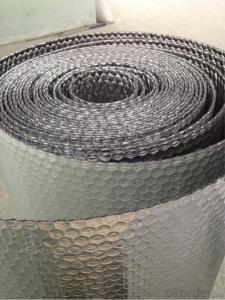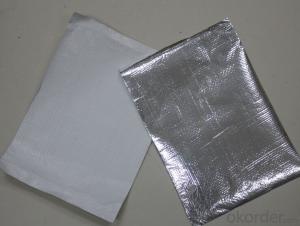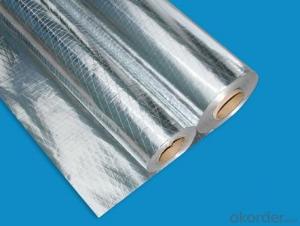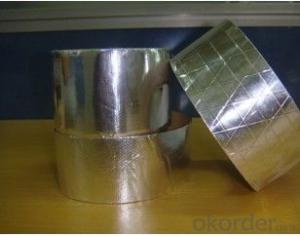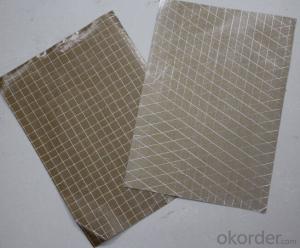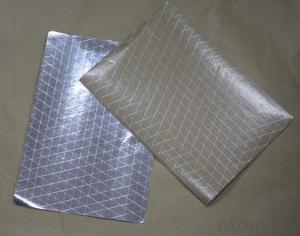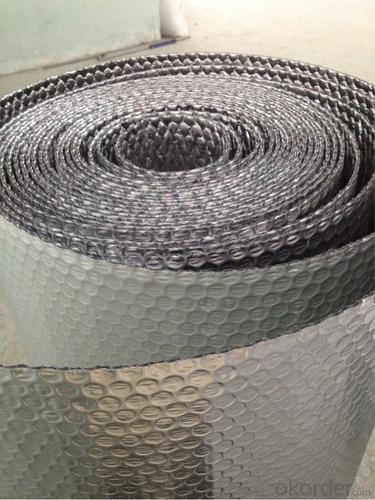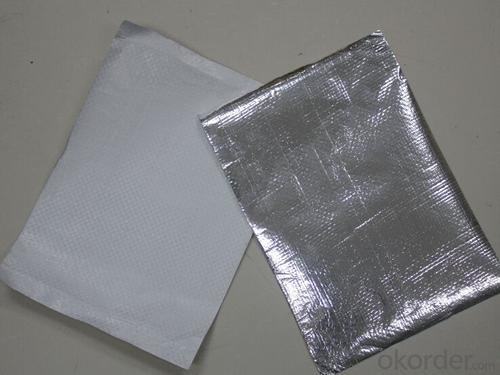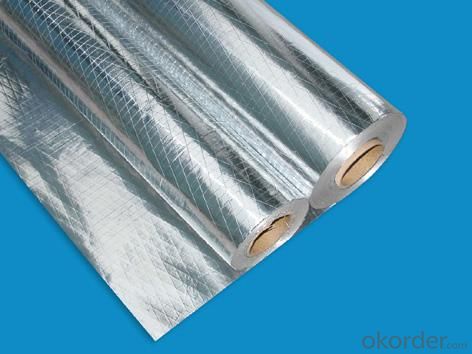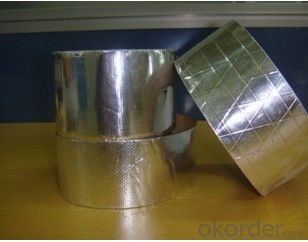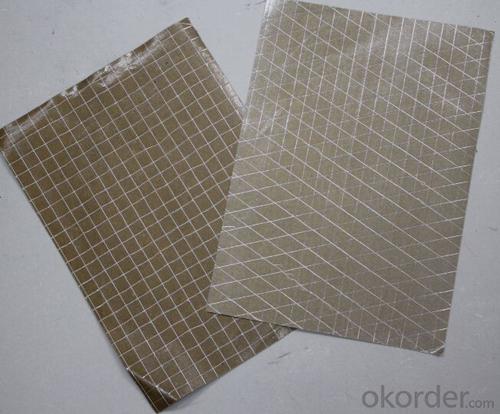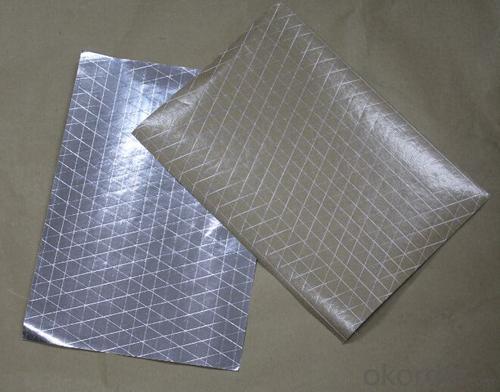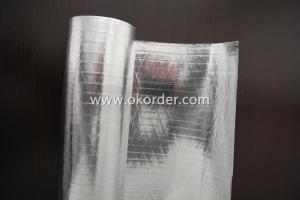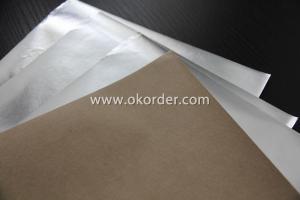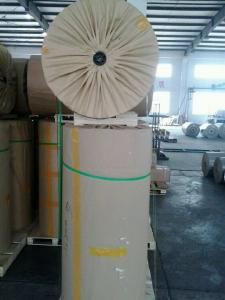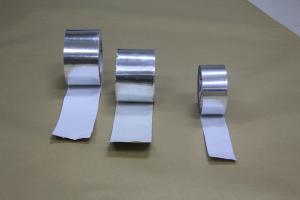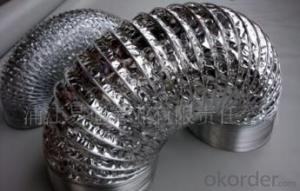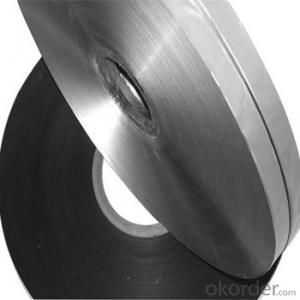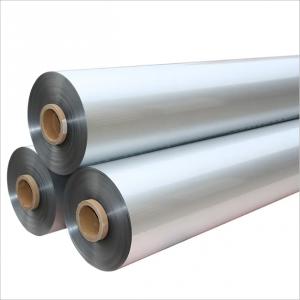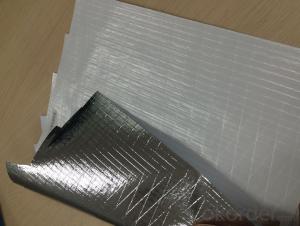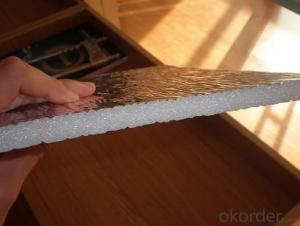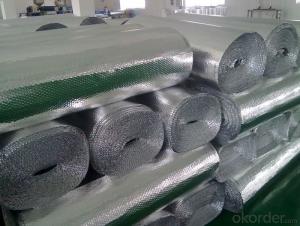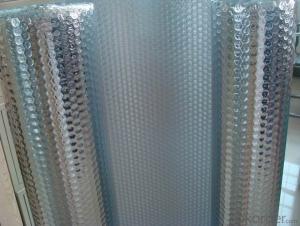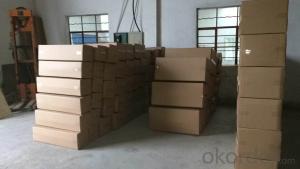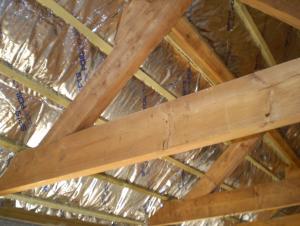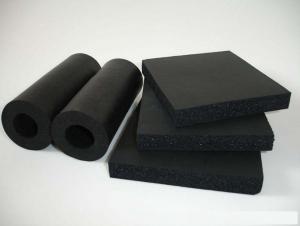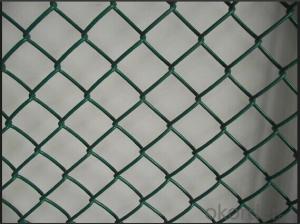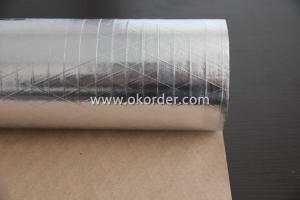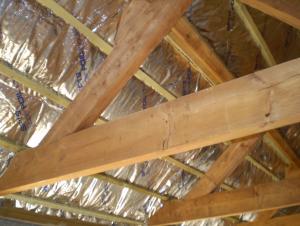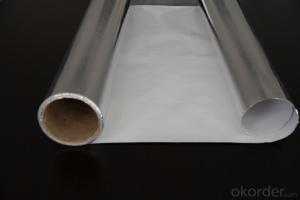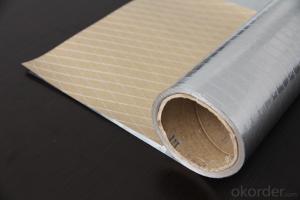Aluminum Foil Facing Insulation Flexible Ducts Bubble Foil AL+LDPE Mylar Film for Heat Seal AL+PET
- Loading Port:
- Tianjin
- Payment Terms:
- TT OR LC
- Min Order Qty:
- 112 m²
- Supply Capability:
- 30000 m²/month
OKorder Service Pledge
OKorder Financial Service
You Might Also Like
).Raw material for Aluminium: 1235-0, 8011
Raw material for PET: New PET ,OPP is also available
2).Different kinds:
| structure | Normal laminated thickness | Width | Length | Color | ID | OD | Packin |
| AL+PET+LDPE | 7umAlu+15umPet+3umGlue | 6mm-1000mm as your required | 500m-7000m | Silver blue bronze black others | 2"or3" | 250mm-600mm | polybag caron pallet
|
| 9umAlu+12umPet+3umGlue | |||||||
| AL+PET+AL | 6umAlu+15umPet+6umAlu+6umGlue | ||||||
| PET+AL+PET | 15umPet+7umAlu+15umPet | ||||||
| AL+PET+EAA | 7umAL+15umPET+25umEAA+6umglue | ||||||
| AL+PET+AL+EAA | 7umAlu+15umPET+7umAlu+25umEAA+9umglue | ||||||
| PET+PET | 15umPet+15umPet +3umGlue | ||||||
| Polyester Tape | 15um,18um |
3).Certificaton: SGS
4).Specifications:
The following is the single side aluminium mylar tape specifications for you take reference:
Description: Al+PET Tape(AL/myler Tape) | ||||
Composition:aluminium foil and polyester film | ||||
Structure | Thickness(um) | Proportion(g/m2) | Elongation(%) | Strength(N/15mm) |
6um AL/12um PET | 20 | 36 | 30 | 2.7 |
7um AL/15um PET | 25 | 43 | 35 | 2.7 |
7um AL/20um PET | 30 | 50 | 35 | 3 |
9um AL/12um PET | 25 | 45 | 30 | 2.7 |
9um AL/15um PET | 30 | 49 | 35 | 3 |
9um AL/20um PET | 35 | 55 | 35 | 3 |
9um AL/25um PET | 38 | 62 | 35 | 4 |
12um AL/12um PET | 25 | 53 | 20 | 2 |
12um AL/15um PET | 30 | 57 | 20 | 3 |
12um AL/20um PET | 35 | 63 | 30 | 4 |
15um AL/15um PET | 30 | 65 | 20 | 3 |
25um AL/15um PET | 45 | 92 | 20 | 3 |
30um AL/25um PET | 60 | 119 | 20 | 3 |
30um AL/30um PET | 65 | 126 | 20 | 5 |
40um AL/30um PET | 75 | 153 | 20 | 5 |
40um AL/38um PET | 80 | 163 | 20 | 5 |
50um AL/25um PET | 90 | 173 | 20 | 5 |
50um AL/50um PET | 100 | 207 | 35 | 6 |
Above values refer to our current production and must be intended as average values | ||||
The reference is not including all specification. | ||||
- Q: Is it possible to replace plastic wrap with aluminum foil for food storage or packaging purposes?
- <p>While aluminum foil facing can be used in some instances for food storage or packaging, it is not a direct substitute for plastic wrap. Aluminum foil is more durable and heat resistant, making it suitable for covering dishes or wrapping food for cooking or freezing. However, it is not as clingy or airtight as plastic wrap, which can be crucial for preserving freshness and preventing cross-contamination. Additionally, aluminum foil is not microwave-safe, unlike plastic wrap, which can limit its use in certain food storage applications. For best results, use the appropriate material based on the specific needs of food storage or packaging.</p>
- Q: This question asks about the proper way to store aluminum foil to keep it facing the right way for easy use.
- <p>To store aluminum foil facing the right way, first use up one side completely. Then, fold the remaining foil in half with the shiny side facing out. Place the folded foil back into the box or container, shiny side up. When you need to use it next, the shiny side will be facing you, making it easy to tear off. To keep it flat and wrinkle-free, you can place a piece of cardboard inside the box, or roll it around a clean, empty paper towel tube.</p>
- Q: This question asks about potential health or safety risks associated with the use of non-stick coatings on food covers or containers.
- <p>Non-stick coatings on food covers or containers are generally safe when used as directed. However, there are some concerns. High heat can cause these coatings to release potentially harmful fumes or chemicals, such as perfluorooctanoic acid (PFOA), which has been linked to health issues. It's important to avoid overheating non-stick items and to not use them in the oven or broiler. Always follow the manufacturer's guidelines for safe use and cleaning. If the coating is scratched or peeling, it's best to replace the item to prevent ingestion of the coating particles.</p>
- Q: What are the advantages of using food covers made from materials other than traditional ones, specifically regarding health benefits?
- <p>Yes, there are health benefits to using food covers made from alternative materials. For instance, using food covers made from materials like beeswax or silicone can reduce the use of single-use plastic, which is beneficial for both the environment and human health by minimizing exposure to harmful chemicals that can leach from plastic. Additionally, some materials like glass or stainless steel food covers are non-porous and do not retain odors or bacteria, which can help maintain food freshness and safety. Using eco-friendly and reusable food covers can also contribute to a reduction in waste, promoting a healthier planet and, by extension, a healthier lifestyle.</p>
- Q: This question asks for methods to prevent aluminum foil from sticking to itself when stored or used.
- <p>To prevent aluminum foil from sticking to itself, you can try several methods. First, store it with a sheet of wax or parchment paper between each layer to create a barrier. Second, lightly coat the foil with cooking spray or oil before stacking. Alternatively, use a paper towel as a separator. When using, dampen the foil slightly with water to reduce the sticking. Additionally, you can purchase non-stick aluminum foil or use plastic wrap as a substitute. These methods will help maintain the separation and functionality of aluminum foil.</p>
- Q: Explain the distinctions between aluminum foil facing and plastic wrap, including their composition, uses, and properties.
- <p>Aluminum foil facing is a thin layer of aluminum used for insulation, moisture protection, and as a barrier to light and air. It is commonly used in construction and food packaging for its heat and cold resistance. Plastic wrap, on the other hand, is made from plastic polymers like polyethylene and is primarily used for food storage, keeping food fresh by sealing in moisture and preventing contamination. Unlike aluminum foil, plastic wrap is transparent, clingy, and does not conduct heat, making it unsuitable for cooking or insulation purposes.</p>
- Q: What are the materials and elements that make up the aluminum foil facing?
- <p>Aluminum foil facing is primarily composed of aluminum, which is a lightweight, malleable, and ductile metal with the symbol Al and atomic number 13. It is commonly used in construction, packaging, and cooking due to its excellent thermal and electrical conductivity, as well as its resistance to corrosion. The aluminum used for foil is typically of high purity, but it may also contain trace amounts of other elements to enhance certain properties, such as copper to improve strength or magnesium to increase resistance to corrosion. The facing can also have a protective layer or coating to prevent oxidation or to enhance its performance in specific applications.</p>
- Q: Is there a risk associated with using aluminum foil with raw meat or fish?
- <p>Yes, it is generally safe to use aluminum foil when handling raw meat or fish, as long as it is food-grade aluminum foil. Aluminum foil is designed to be non-toxic and resistant to corrosion, making it suitable for cooking and food preparation. However, it's important to ensure that the foil does not tear or puncture, as this could allow bacteria to contaminate the food. Additionally, avoid using aluminum foil in direct contact with acidic foods, as this can cause the foil to corrode and potentially release aluminum into the food. Always follow proper food safety guidelines when preparing and cooking with raw meats and fish.</p>
- Q: What specific safety measures should be considered when utilizing aluminum foil in a kitchen setting?
- <p>When using aluminum foil in the kitchen, it's important to handle it carefully to avoid sharp edges that can cause cuts. Avoid using it in direct contact with an open flame as it can melt and release toxic fumes. Do not use aluminum foil with non-stick cookware as it can damage the surface. Keep it away from high heat sources like broilers and never use it to line baking sheets as it can catch fire. Always ensure that any food wrapped in aluminum foil is sealed properly to prevent the foil from coming into contact with heat sources directly.</p>
- Q: This question asks for a comparison between domestic and foreign aluminum foil, specifically focusing on their differences.
- <p>The differences between domestic and foreign aluminum foil facing primarily lie in material quality, manufacturing processes, and market positioning. Domestic aluminum foil often uses locally sourced materials and may have variations in thickness and quality, while foreign foil might employ higher-grade materials for enhanced durability and consistency. Manufacturing processes abroad may incorporate advanced technology, leading to better surface smoothness and uniformity. Additionally, foreign aluminum foil is often marketed as premium, targeting niche segments with specific requirements for quality and performance. Domestic foil, on the other hand, is generally more affordable and caters to a broader market, including everyday household use.</p>
Send your message to us
Aluminum Foil Facing Insulation Flexible Ducts Bubble Foil AL+LDPE Mylar Film for Heat Seal AL+PET
- Loading Port:
- Tianjin
- Payment Terms:
- TT OR LC
- Min Order Qty:
- 112 m²
- Supply Capability:
- 30000 m²/month
OKorder Service Pledge
OKorder Financial Service
Similar products
Hot products
Hot Searches
Related keywords
